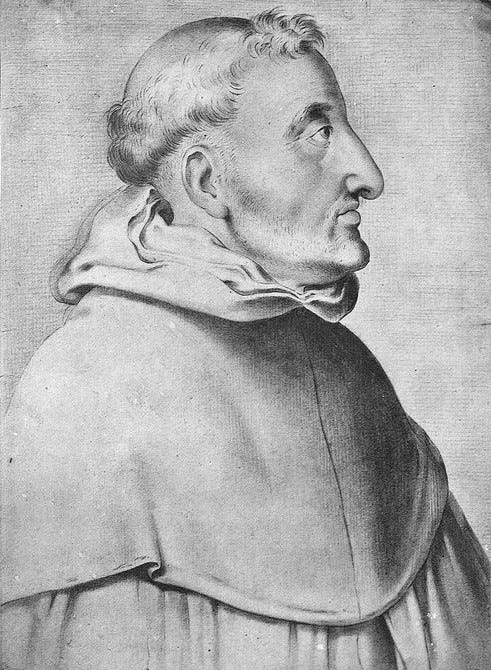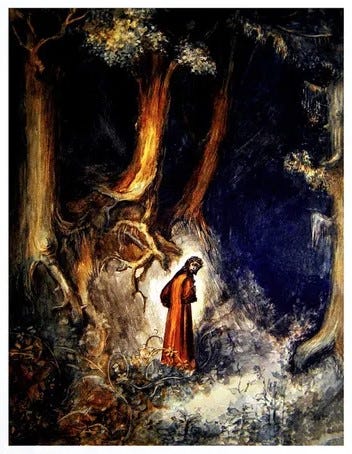Louis of Granada (1504-1588) was a Dominican friar born in Granada soon after the completion of the Spanish Reconquista in 1492. The man was immensely gifted with talents and favored by princes, but chose the life of a humble preacher instead of accepting great positions he was offered – including those of a bishop and a cardinal.
His popular and lasting masterpiece is the Sinner’s Guide (La Guia de Pecadores) from 1555. The book became an international sensation, and its success gave Louis great riches, all of which he gave to the poor. He spent his life as a strict ascetic, an exemplar of living as you preach.
In this article I present some of the key insights I found in Louis’ book.
Gems twenty-seven
1. Man wished to share the riches offered by Lucifer. Now we all share the Devil’s punishment.
2. Our union with God is unique in all creation, because out of all created things, He chose to become a man, sharing our lot in the most intimate way. God’s own incarnated person became the seal of our union.
3. Louis presents an interesting, ambivalent discussion on election or predestination. One way to understand his position is that there are some people God so desires to have in his presence – or whose role in his plan of salvation is so crucial – that he has elected them before they were born (perhaps people like Abraham, Moses, Mary, John, or Peter) and guards them from damnation, while the fate of others is more contingent.
4. Ultimately the Devil functions as the executioner or headsman of God the Judge, like presented in the book of Job. If a man does not fear God the Judge, then let him contemplate the horrible executioner in whose hands he shall be left after Judgment.
5. Treasures of Grace are to be understood as wings and sails which help us on our voyage to eternity. Their nature is both material and spiritual. Besides aiding our salvation, they function as divine favors which sweeten the sacrifices and abnegations necessary on the strait and narrow.
6. God manifests a special (one might say extra-providential) care for the faithful, the virtuous, the righteous. This is one of the practical motives Louis gives for living a righteous life: you make yourself a willing ally of God, and there is no mightier helper.
7. Knowledge divinely communicated is qualitatively different from knowledge learned in schools. The latter illumines the intellect, but the former strengthens the will and directs it towards the good. It penetrates into the depths of the soul, and transforms our passions – ultimately likening us to Christ.
8. The woman naturally depends upon the man, as ivy depends on a tree. Louis points out that an unfaithful wife knows she will be killed by her husband, and shall shame herself and her whole family. Despite this knowledge, she decides to be unfaithful. Such is the depth of human brokenness.
9. Louis is particularly hard on all unrighteous love.
“Fatal passion! Oh! Pestilential vice, destroying families and overthrowing kingdoms! It is the poison of souls, the death of genius, the folly of old age, the madness of youth, and the bane of mankind.”
10. Whatever you ask shall be given. Provided of course that it helps your salvation and doesn’t hinder it. Yet bear in mind also that cold prayer without good works and charity cannot please God.
11. No man can escape the trials of life. Bear them patiently. Impatience and rebellion only add to the burden. The nature of trials is to make the good more beautiful, and to consume the wicked.
12. Do not fall to the false calculations of those who urge you to delay conversion. Remember that bad habits become second nature, and overcoming nature is the most difficult of tasks. Repent your sins before a habit is allowed time to form! Healing is more difficult with a chronic disease.
13. “Without fear of God the soul is like a ship without ballast.” Fear of God lets you resist winds that would otherwise make you keel or lose your way. Mature fear of God in fact springs from love of God, as we naturally fear to hurt those we love. But even a servile fear of God may be good, as it can work as an introduction to the higher, filial fear.
14. “Do not confuse hope with presumption!” Ideas of utterly secure salvation fall in the latter camp.
15. “Virtue is difficult to nature, easy to grace.” So in addition to striving for virtue, also remember to constantly pray for it.
16. In the Bible the Devil is called the Prince of this world. Louis understands this to mean that he is the ruler of evil men and of evil spirits. It does not mean that the Devil can compete with God over the dominion of God’s creation.
17. Trust not to happiness offered by the World. “The ignorant are allured by it, as fish are drawn to their destruction by a glittering bait. But experience soon dissipates our illusions; we feel the sting of the hook almost as soon as we take the bait.”
18. As one of the forms of superficial happiness offered by the world, Louis warns the reader against marriage in a particularly affecting way:
“Take, for example, the happiness of a newly married couple. In many cases how brief it is! How soon it is interrupted by troubles and anxieties; by the cares of children; by sickness; by absence; by jealousy; by misfortunes; by grief; and sometimes by death itself, which suddenly changes it for one or the other into desolate widowhood!
How smilingly the bride goes to the altar, seeing only the exterior of what is before her! Were it given to her to see the weight of responsibility which she takes upon her that day, tears would replace her smiles.”
Perhaps the lesson here is to approach marriage as a spiritual test and an opportunity for sacrifice, rather than as a source of earthly happiness. The former you can always rely on it offering, the latter it bestows only sometimes.
19. Another weakness in building our life on earthly happiness is that sorrow always affects us more than happiness. Slander more than praise. Even a single ungratified desire is enough to make us miserable.
20. What can the World truly offer you?
“What is this world, then but a land of toil, a school of vanity, an asylum of illusions, a labyrinth of errors, a prison of darkness, a highway of thieves, a stream of infected water, an ocean of perpetual storms?
It is a barren soil, a stony field, a thorny wood, a meadow whose flowers conceal serpents, a garden full of blossoms but yielding no fruit, a river of tears, a fountain of cares, a deceptive poison, a perfect fiction, a pleasing frenzy.
Its good is false, its evil real, its peace is restless, its security unfounded, its fears groundless, its labor profitless, its tears fruitless, its hope vain, its joy false, its grief real.”
So fallen is the World that St. Bernard argues that were it not for the hope of a better life beyond, there would be little difference between this world and Hell itself.
21. Self-knowledge means that you come to realize there is no good reason for self-confidence. Only reason for thankfulness and shame. Even our good actions are usually partly evil, partly selfish.
22. Whenever you feel self-satisfied, remind yourself of your most shameful sins.
23. Don’t complain about suffering: it is all justly merited by your sins.
24. “Do good and suffer.” Thus can be formulated the two primary duties of man on this earth. According to Louis, the ultimate earthly goal is to be able to rejoice in your suffering.
25. Train your children for the Kingdom of Heaven.
26. What reason have you to think that Paradise can be reached by pleasure and amusement?
27. Always stand prepared for the corrupt world, for the frail flesh, for the malice of men, and for the envy of devils.







